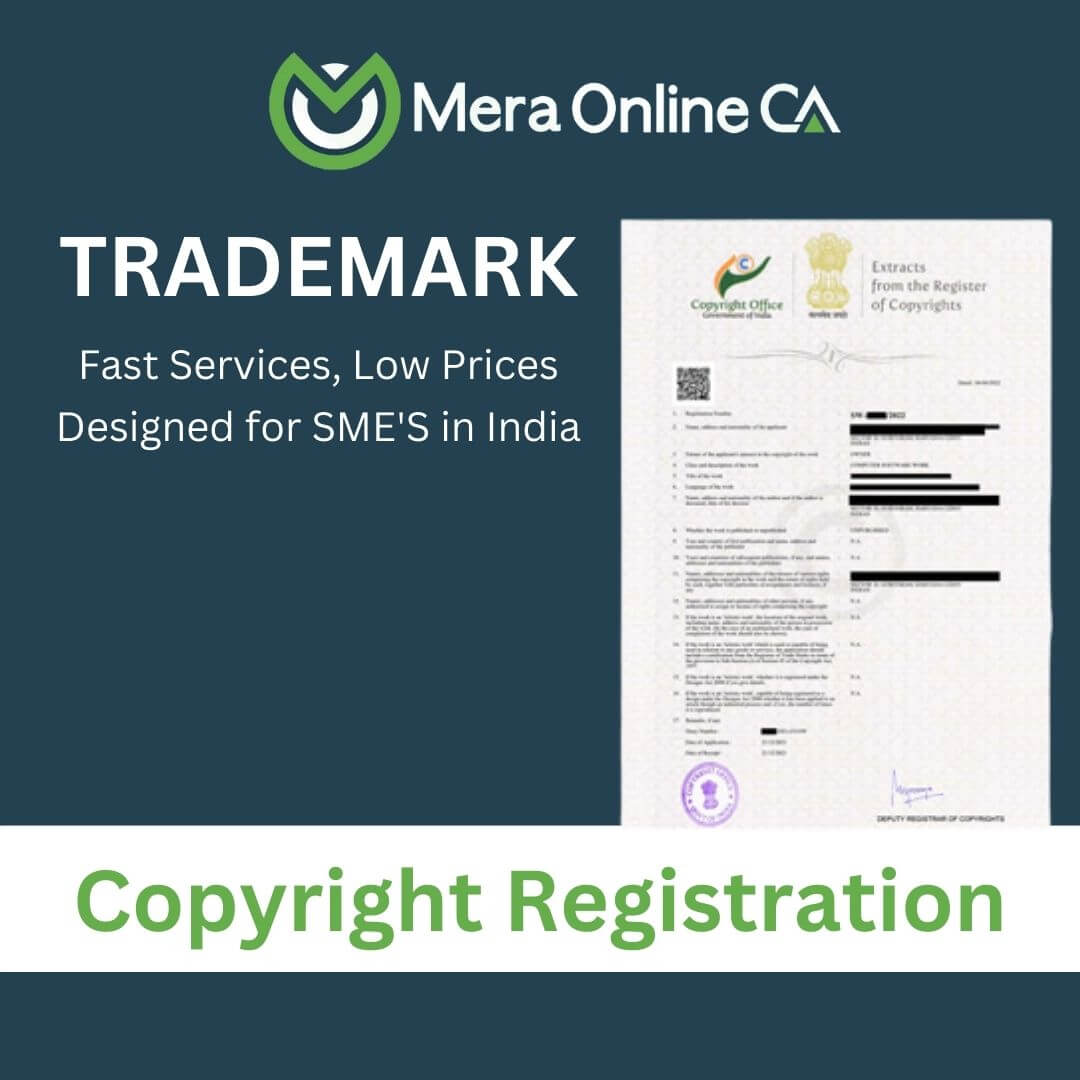Copyright Registration
Copyright refers to the ownership rights to literature, theatre, music, artwork, sound recordings, and other works. Copyright registration grants a set of rights to the work, including reproduction, public communication, adaptation, and translation. Copyright registration ensures that the writers’ rights to ownership and enjoyment of their works are protected and rewarded, which protects and rewards creativity.
Copyright registration is required since it allows you to communicate with the public, reproduce the rights, adapt, and translate the works.
As understanding of intellectual property rules has grown, there has been a significant increase in the amount of intellectual property being registered in India. One of the most important types of intellectual property protection is copyright registration.
The Copyright Act of 1957 governs the process of copyright registration. The author’s creative work cannot be replicated since no one is permitted to use it without the author’s or creator’s consent. The author has the right to charge for the use or modification of their work. The copyright is usually protected for 60 years.
Eligibility
Copyright registration can be obtained for any works related to literature, drama, music, artwork, film, or sound recording. Copyrights are given to mainly three classes of work, and each class has its distinctive right under the copyright act.
Benefits of acquiring Copyright Registration
Provides Legal Protection
The creators enjoy legal protection when their work is reproduced without authorization. Registering a Copyright makes it much easier to protect the original work against infringement.
Market Presence
Copyright registration creates a public record of the work, and proof of ownership is established for the creative work.
Rights Of The Owner
The owner of registered copyright gets the rights to reproduce, disseminate and adapt and translate the work.
Process for Copyright Registration
Copyright registration applications can be submitted on Form IV along with the required fees. It can be copyrighted whether it is a published or unpublished work. Three copies of published material must be supplied with the application for published work.
For unpublished work, a copy of the manuscript must be supplied with the application for affixing the copyright office’s stamp, which serves as proof that the work has been registered.
The process for Copyright Registration:
Copyright Protection Validity
Copyright protection usually lasts for 60 years. The 60-year period begins with the author’s death year in the case of original literary, theatrical, musical, and artistic works.
The 60 years is counted from the publication date in the case of cinematographic films, sound recordings, pictures, posthumous publications, anonymous and pseudonymous publications, works of government, and activity of international organisations.
The remedy in case of Copyright Infringement
Infringement against the copyright of any work is a crime punishable under Section 63 of the Copyright Act. Six months in prison and a fine of Rs. 50,000 are possible penalties.
Also, if a copyright violation has occurred or is likely to occur, any police officer not below the rank of sub-inspector may, if satisfied, take all copies of the work and the plates used to make infringing copies of work without a warrant.
Copyright Objection
There is a possibility that the registrar will raise objections to the copyright application during the registration procedure. An objection may arise for a variety of reasons, including application similarities and the existence of similar work. Copyright objections can be raised up to 30 days after the copyright application is filed.
If any objections arise after a thorough assessment of the application, the registrar tells the applicant and requests clarifications. It is critical to respond to the copyright objection letter because it is a legal requirement. If no response is received, the registrar may terminate the copyright application, which is then amended in the copyright journal as “rejected.”
To avoid such outcomes, it is critical to reply to the copyright objection in order to obtain and maintain the work’s legal rights.
As a legal letter, replying to a copyright objection letter necessitates legal understanding and drafting skills. There is no fixed format to draft a response to copyright objection letter.
Rights of the Copyright owner
Right of reproduction
Copyright registration grants exclusive rights to the copyright owner. An individual cannot make copies or reproduce work without the permission of the copyright owner.
Right of Adaptation
The Act allows the creator to use his piece of work the way he wants to use it. He can create any derivatives of his original work. He can also use a different format based on his existing creation.
Right of Communication To The Public
The owner can broadcast their original work to the public. The copyright owner can use visual signs or even images.
Right of Public Performance
The owners of artistic and musical work can perform their works in public. A musician can play his piece of music for the people. An artist can perform in public or any platform the artist wishes to.
Right of Paternity And Integrity
The producers of original work are endowed with moral and ethical rights. The right of attribution, often known as paternity, means that the artist can claim sole authorship of his work.
The right of integrity empowers the owner to sue the individuals for damages. If someone attempts to mutilate, change, or distort the original work, the copyright holder can sue for damages.
Right of Distribution
The Copyright Act allows the owner to distribute his work in whatever form he likes. If he wishes, he can also transfer certain rights to another person to use the copyright.
Lawful Use of Copyrighted Work Without Permission
Under some circumstances, the legislation permits the use of a registered work for research, study, critique, review, and news reporting without the owner’s permission, as well as the use of works in libraries, schools, and legislatures. Some exclusions have been prescribed in respect of specific uses of copyrighted works to protect users’ interests. The usage of the work is one of the exemptions.






1. Can titles or names be copyrighted?
15 November 2021
A copyright registration does not protect the titles or names, short words, slogans, or any phrases. Only original literary work can get copyright registration.
2. What is the difference between Copyright registration and trademark registration?
15 November 2021
Trademark registration protects the brand name, logo the slogan whereas copyright protection is provided to literary works, music, videos, slogans, and artistic contents.
3. How Long is the Copyright registration valid?
07 December 2021
Once obtained copyright registration has a validity of 60 years. In case it is literary, drama, music work the 60-year validity is considered from the death of the author. But in the case of the films, sound recording, photographs the 60 year validity period is considered from the date of publication.
4. Copyright obtained in India is only valid in India or across the world?
08 December 2021
According to the Berne Convention, copyright obtained in India will get the status of foreign workers and the copyright protection is extended to the countries which are signatories to the Berne Convention.
5. Is it possible to sell or transfer Copyright registration?
07 December 2021
With the consent from the owner of the work, the copyright registration can be sold, transferred, gifted as well as franchised.
6. What are the benefits of copyright registration?
08 December 2021
The holder can translate, reproduce, adapt, create the work, and also to the right to be credited for his contribution, a right for who can adapt the work to other forms.
7. How long does it take to obtain the copyright registration?
07 December 2021
A copyright registration can be obtained in around 6-8 months considering factors like objection etc.
8. Is it necessary to publish work before copyrighting it?
08 December 2021
Both Published as well as unpublished work can be registered, in case work is already published the details of the publishing are to be furnished with the application.
9. Can a copyright registration application get rejected?
08 December 2021
Yes in case of any discrepancy or incomplete documents a copyright registration may get rejected.
10. Who can obtain Copyright registration?
08 December 2021
Any person or a business entity can obtain copyright registration. An individual can be an author, creator, musician, photographer, producer, painter, composer, or company.
11. What to do in case of infringement of copyright?
08 December 2021
A copyright holder has to send a statutory notice to the person who has infringed the work.